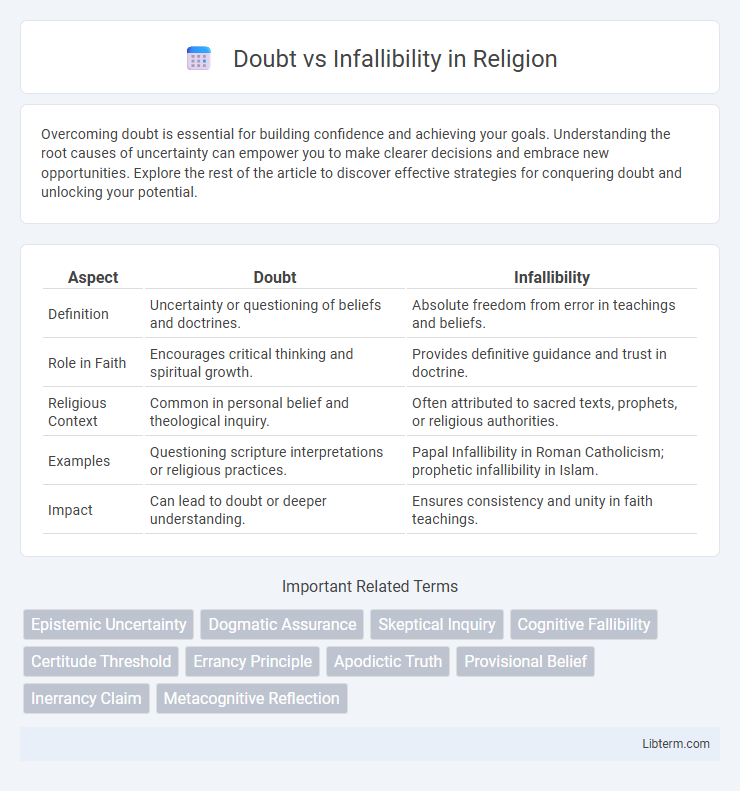Overcoming doubt is essential for building confidence and achieving your goals. Understanding the root causes of uncertainty can empower you to make clearer decisions and embrace new opportunities. Explore the rest of the article to discover effective strategies for conquering doubt and unlocking your potential.
Table of Comparison
| Aspect | Doubt | Infallibility |
|---|---|---|
| Definition | Uncertainty or questioning of beliefs and doctrines. | Absolute freedom from error in teachings and beliefs. |
| Role in Faith | Encourages critical thinking and spiritual growth. | Provides definitive guidance and trust in doctrine. |
| Religious Context | Common in personal belief and theological inquiry. | Often attributed to sacred texts, prophets, or religious authorities. |
| Examples | Questioning scripture interpretations or religious practices. | Papal Infallibility in Roman Catholicism; prophetic infallibility in Islam. |
| Impact | Can lead to doubt or deeper understanding. | Ensures consistency and unity in faith teachings. |
Understanding Doubt and Infallibility
Understanding doubt involves recognizing it as a cognitive state of uncertainty or questioning, essential for critical thinking and problem-solving. Infallibility refers to the inability to err or be wrong, often attributed to certain authoritative sources or systems, which provides unwavering certainty. Balancing doubt and infallibility enhances decision-making by allowing room for questioning while trusting reliable knowledge or truths.
Historical Perspectives on Certainty and Doubt
Historical perspectives on certainty and doubt reveal contrasting philosophical approaches where early thinkers like Descartes emphasized systematic doubt as a path to achieving infallible knowledge. Medieval scholars often linked infallibility to divine revelation, positioning absolute certainty beyond human reason, while Enlightenment philosophers promoted empirical evidence to resolve doubts. These evolving views highlight the tension between unquestionable truth and the necessity of skepticism in the pursuit of knowledge.
Psychological Roots of Doubt
Doubt originates from cognitive dissonance and the psychological need for certainty, often triggered by conflicting information or past experiences that undermine trust. Infallibility, by contrast, is a psychological construct rooted in the desire for absolute knowledge and perfection, often driven by cognitive biases such as overconfidence and confirmation bias. Understanding doubt's psychological roots involves exploring its role in critical thinking, adaptive learning, and emotional regulation within decision-making processes.
The Appeal of Infallibility in Human Belief
The appeal of infallibility in human belief lies in the cognitive comfort provided by absolute certainty and the reduction of existential anxiety. Infallibility offers a psychological anchor, minimizing the mental burden of continuous doubt and fostering social cohesion through shared, unquestionable truths. This phenomenon is evident in religious dogmas, authoritative ideologies, and even in scientific paradigms that resist revision despite emerging conflicting evidence.
Doubt as a Catalyst for Growth
Doubt serves as a powerful catalyst for growth by challenging assumptions and encouraging critical thinking, leading to deeper understanding and innovation. Unlike infallibility, which implies absolute certainty and resistance to change, doubt fosters continuous learning and adaptation in both personal and intellectual development. Embracing doubt promotes resilience and open-mindedness, essential traits for navigating complex problems and advancing knowledge.
Infallibility in Religion and Philosophy
Infallibility in religion often refers to the divine or doctrinal inability to err, ensuring absolute authority in sacred texts or spiritual leadership, such as the infallibility of the Pope in Catholicism. Philosophically, infallibility challenges the notion of human knowledge by questioning whether any belief can be known with complete certainty, influencing epistemological discussions on skepticism and justification. This concept underscores the tension between doubt and certainty, highlighting the pursuit of ultimate truth in both theological and philosophical frameworks.
Doubt in Scientific Inquiry
Doubt in scientific inquiry drives rigorous testing and critical evaluation, fostering continuous refinement of hypotheses and theories. It encourages skepticism and empirical validation, preventing premature conclusions and enhancing the reliability of scientific knowledge. This systematic questioning is essential for scientific progress, distinguishing it from the assumption of infallibility that can hinder innovation and discovery.
The Dangers of Infallible Thinking
Infallible thinking disregards critical questioning, which leads to cognitive rigidity and the suppression of alternative perspectives. This mindset increases the risk of errors going unchallenged, potentially causing flawed decisions in personal and organizational contexts. Embracing doubt encourages continuous learning and adaptability, essential for innovation and effective problem-solving.
Balancing Doubt and Confidence
Balancing doubt and confidence requires recognizing doubt as a critical tool for questioning assumptions and driving intellectual growth while maintaining confidence to take decisive actions based on reliable knowledge. Infallibility is an unrealistic ideal; instead, fostering a mindset that values skepticism alongside trust in evidence enables more accurate decision-making. Cognitive flexibility is essential for integrating doubt without undermining productive confidence in personal and professional contexts.
Embracing Uncertainty for Personal Development
Embracing uncertainty by acknowledging doubt fosters critical thinking and self-awareness, key components for personal development. Recognizing the limits of infallibility encourages continuous learning and adaptability in an ever-changing world. This mindset promotes resilience and innovation, enabling individuals to navigate challenges with confidence and growth.
Doubt Infographic

 libterm.com
libterm.com